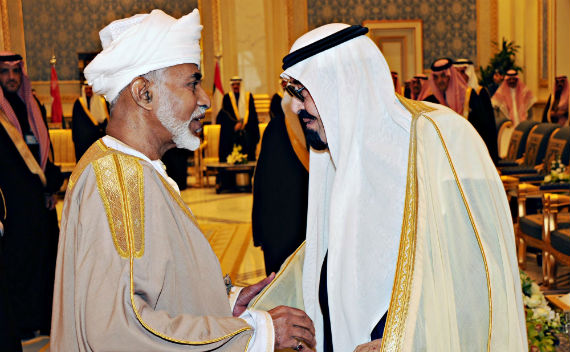Guest Post: Behind Recent GCC Calls for Unity
More on:

This post is written by my colleague, Kelley Calkins, a research associate at the Council on Foreign Relations. Here she offers her assessment of recent GCC calls for unity following this week’s annual GCC summit.
Speaking to his Gulf Cooperation Council (GCC) counterparts at the annual GCC summit in Riyadh on Monday, Saudi Arabia’s king Abdullah suggested to the group that they "move from a phase of cooperation to a phase of union within a single entity.” This call was echoed by the other GCC leaders yesterday in the final communique issued at the conclusion of the summit, which also included a directive for Syria to accept the Arab League peace plan. Such grandiose calls for unity and collective decision-making are unusual given the GCC’s lackluster history of organizational cohesiveness and action. It is the dramatically changing regional context, however, that explains this newfound call to action.
First, though the GCC states (Kuwait, Bahrain, UAE, Oman, Saudi Arabia, and Qatar) have escaped relatively unscathed from the popular uprisings that continue to sweep the Middle East, they have not been totally unaffected. The ultra-wealthy Gulf monarchs have managed threats of instability by throwing money at their populations, but remain, clearly, somewhat nervous. Indeed, Kuwait has recently undergone a cabinet reshuffle, Bahrain continues to see oppositionist action, and unrest has cropped up in Saudi Arabia’s Eastern Province.
The GCC’s urging of Syria to accept the Arab League plan, then, represents in part a move to cater to Arab public opinion. As demonstrated by a recent poll conducted by the Arab American Institute Foundation, popular Arab public opinion has decisively turned against Syria’s president Bashar al-Assad. Calls from the GCC to accept the Arab League peace plan represent an attempt to be “on the right side of history” and embody the new regional spirit of Arab proactive action as also demonstrated by the Arab League.
More importantly, the GCC’s calls for unity evidence its strategy for dealing with increasing threats to instability within the Gulf. The GCC demonstrated in March when it collectively sent 1,200 troops into Shia-dominated Bahrain to swiftly put down popular protests there, that the Sunni Gulf monarchies will not tolerate threats to their rule. A strong, united GCC sends a more powerful message to would-be oppositionists and reformers than each state acting individually would.
As much as the GCC intervention in Bahrain was a message to protesters that dissent would not be tolerated, it was more a message for the GCC’s primary regional rival: Shiite-dominated Iran. More than anything else, the GCC’s calls for unity are a response to its perceived heightened vulnerability to Iranian influence. The closing statements of the summit even called on Iran directly to “stop these policies and practices ... and stop interfering in the internal affairs" of the Gulf states.
Indeed, Iranian-Saudi relations have been at an all time low since Washington reported an Iranian assassination attempt on Saudi’s ambassador to the United States in October. Despite the Iranian foreign minister’s visit to Saudi to allay the kingdom’s fears last week, tensions between the two countries remain high.
Recent U.S. foreign policy developments have intensified this perception of vulnerability to Iranian influence. The withdrawing of U.S. troops from Shiite-dominated Iraq leave what the GCC is worried will become a power vacuum filled by Iran, a thought that is especially nerve-wracking as talk of Iran’s nuclear program continues to swirl. The United States has done little to quell this concern with its announcement last week that it will return troop levels in the Gulf to pre-1990 levels. As a U.S. troop presence helps keep Iranian influence in check, the removal of troops from Iraq and announcement that troop levels will not be bolstered elsewhere in the Gulf has the effect of signaling the GCC that it will have to take up a greater role in ensuring its own security. The GCC states still resent the U.S. decision to break with its longstanding ally Mubarak prior to his fall. This too, underlies their fears.
Notably, these calls for greater unity, seemingly strong, have not been followed up by any specific plans. The Arab leaders have agreed vaguely to “study the options” for when they plan to meet next--in March. Based on the GCC’s weak historical precedent, little, if anything, is likely to emerge from these calls.
Though the GCC has made some progress toward greater unity and activism, not much is likely to change without an intensification of regional pressure. Unless there are on-the-ground shifts that dramatically affect geopolitical spheres of influence in the region--such as a U.S. or Israeli preemptive attack on Iran which would land the GCC in the crossfire for Iranian retaliation, confirmation that Iran has nuclear weapons, or an unexpected billowing out of public unrest in Saudi Arabia—the GCC states will unlikely feel the necessary political pressure to take further steps toward meaningful unification.
More on:
 Online Store
Online Store
